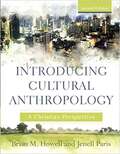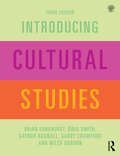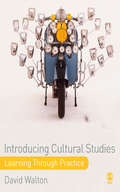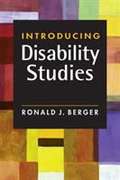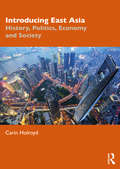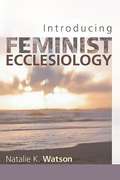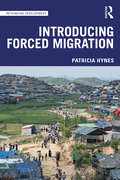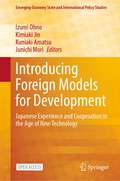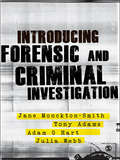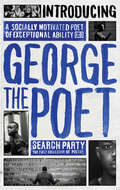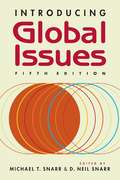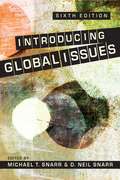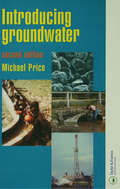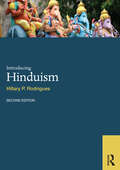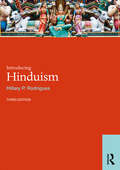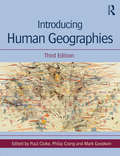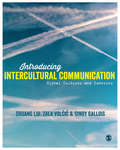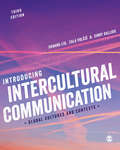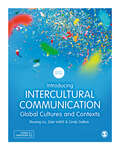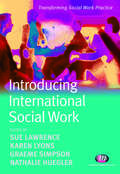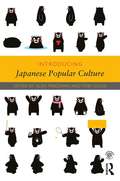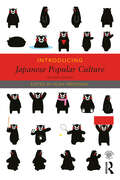- Table View
- List View
Introducing Cultural Anthropology: A Christian Perspective
by Brian M. Howell Jenell ParisWhat is the role of culture in human experience? This concise yet solid introduction to cultural anthropology helps readers explore and understand this crucial issue from a Christian perspective. Now revised and updated throughout, this new edition of a successful textbook covers standard cultural anthropology topics with special attention given to cultural relativism, evolution, and missions. It also includes a new chapter on medical anthropology. Plentiful figures, photos, and sidebars are sprinkled throughout the text, and updated ancillary support materials and teaching aids are available through Baker Academic's Textbook eSources.
Introducing Cultural Studies
by Greg Smith Miles Ogborn Gaynor Bagnall Brian Longhurst Garry CrawfordThis updated, new edition of Introducing Cultural Studies provides a systematic and comprehensible introduction to the concepts, debates and latest research in the field. Reinforcing the interdisciplinary nature of Cultural Studies, the authors first guide the reader through cultural theory before branching out to examine different dimensions of culture in detail – including globalisation, the body, geography, fashion, and politics. Incorporating new scholarship and international examples, this new edition includes: New and improved 'Defining Concepts', 'Key Influences', 'Example ', and 'Spotlight' features that probe deeper into the most significant ideas, theorists and examples, ensuring you obtain an in-depth understanding of the subject. A brand new companion website featuring a flashcard glossary, web links, discussion and essay questions to stimulate independent study. A new-look text design with over 60 pictures and tables draws all these elements together in an attractive, accessible design that makes navigating the book, and the subject, simple and logical. Introducing Cultural Studies will be core reading for Cultural Studies undergraduates and postgraduates, as well as an illuminating guide for those on Communication and Media Studies, English, Sociology, and Social Studies courses looking for a clear overview of the field.
Introducing Cultural Studies
by Greg Smith Miles Ogborn Gaynor Bagnall Brian Longhurst Garry CrawfordThis updated, new edition of Introducing Cultural Studies provides a systematic and comprehensible introduction to the concepts, debates and latest research in the field. Reinforcing the interdisciplinary nature of Cultural Studies, the authors first guide the reader through cultural theory before branching out to examine different dimensions of culture in detail – including globalisation, the body, geography, fashion, and politics.Incorporating new scholarship and international examples, this new edition includes: New and improved 'Defining Concepts', 'Key Influences', 'Example ', and 'Spotlight' features that probe deeper into the most significant ideas, theorists and examples, ensuring you obtain an in-depth understanding of the subject A brand new companion website featuring a flashcard glossary, web links, discussion and essay questions to stimulate independent study A new-look text design with over 60 pictures and tables draws all these elements together in an attractive, accessible design that makes navigating the book, and the subject, simple and logical Introducing Cultural Studies will be core reading for Cultural Studies undergraduates and postgraduates, as well as an illuminating guide for those on Communication and Media Studies, English, Sociology, and Social Studies courses looking for a clear overview of the field.
Introducing Cultural Studies: Learning through Practice
by David Walton"An outstanding entry level text aimed at those with little or no cultural studies knowledge... Innovative, creative and clever." - Times Higher Education "The ideal textbook for FE and first year HE cultural studies students. Its quality and character allow the reader to ‘feel’ the enthusiasm of its author which in turn becomes infectious, instilling in the reader a genuine sense of ebullient perturbation." - Art/Design/Media, The Higher Education Authority An introduction to the practice of cultural studies, this book is ideal for undergraduate courses. Full of practical exercises that will get students thinking and writing about the issues they encounter, this book offers its readers the conceptual tools to practice cultural analysis for themselves. There are heuristics to help students prepare and write projects, and the book provides plenty of examples to help students develop their own ideas. Written in a creative, playful and witty style, this book: Links key concepts to the key theorists of cultural studies. Includes a wide range of references of popular cultural forms. Emphasizes the multidisciplinary nature of cultural studies. Includes pedagogical features, such as dialogues, graphs, images and recommended readings. The book′s skills-based approach enables students to develop their creative skills, and shows students how to improve their powers of analysis generally.
Introducing Disability Studies
by Ronald BergerRonald Berger provides students with a comprehensive, accessible introduction to the key themes and controversies in disability studies. This innovative textbook: • provides historical context, from ancient times to the present • traces disability's impact throughout the life course • gives prominence to the voices of people with disabilities • explores popular culture’s role in distorting ideas about disability • addresses emerging ethical issues, such as the implications of genetic selection. Illustrating the profound consequences of differing conceptions of physical, sensory, and cognitive impairments, Berger provides a solid foundation for making sense of disability as a social phenomenon.
Introducing East Asia: History, Politics, Economy and Society
by Carin HolroydIntroducing East Asia is an ideal textbook for those new to the study of one of the most exciting and important regions in the world. East Asia is a complex and culturally rich region, with the Chinese, Korean and Japanese civilizations among the oldest in the world. Over the past 50 years, Japan, South Korea, Taiwan and China have become economic powerhouses and leaders in the commercialization of science and technology. The countries are economically and culturally intertwined while at the same time burdened by a history of war and conflict. This textbook focuses on the historical and cultural roots of the contemporary political and economic ascendency of East Asia and explores the degree to which East Asian cultures, values and history set up the region for 21st century global leadership. Features in this textbook include: • Chapters on each of the countries and special economic zones that make up the region. • Rich illustrations and timelines to guide the student visually. • Focused textboxes on key figures and events, useful as research assignment and revision materials. Providing undergraduate students with a solid introduction to East Asia, this textbook will be an essential reading for students of East Asian studies, global studies and international studies.
Introducing Feminist Ecclesiology
by Natalie WatsonIntroducing Feminist Ecclesiology explores women's experiences of being church and reclaiming the church in order to rebuild it as a meaningful, open sacramental space where everybody's presence is celebrated. Natalie Watson proposes a creative and constructive dialog with existing theological approaches to the church, from different Christian traditions as well as more recent feminist theologians, and suggests the development of criteria that hear women's experiences of being church and reclaiming church into speech. The church is the embodied reality of all women children and men whose stories tell the story of the Triune God.
Introducing Forced Migration (Rethinking Development)
by Patricia HynesAt a time when global debates about the movement of people have never been more heated, this book provides readers with an accessible, student-friendly guide to the subject of forced migration. Readers of this book will learn who forced migrants are, where they are and why international protection is critical in a world of increasingly restrictive legislation and policy. The book outlines key definitions, ideas, concepts, points for discussion, theories and case studies of the various forms of forced migration. In addition to this technical grounding, the book also signposts further reading and provides handy Key Thinker boxes to summarise the work of the field’s most influential academics. Drawing on decades of experience both in the classroom and in the field, this book invites readers to question how labels and definitions are used in legal, policy and practice responses, and to engage in a richer understanding of the lives and realities of forced migrants on the ground. Perfect for undergraduate and postgraduate teaching in courses related to migration and diaspora studies, Introducing Forced Migration will also be valuable to policy-makers, practitioners, journalists, volunteers and aid workers working with refugees, the internally displaced and those who have experienced trafficking.
Introducing Foreign Models for Development: Japanese Experience and Cooperation in the Age of New Technology (Emerging-Economy State and International Policy Studies)
by Kimiaki Jin Izumi Ohno Kuniaki Amatsu Junichi MoriThis open access book studies how foreign models of economic development can be effectively learned by and applied to today’s latecomer countries. Policy capacity and societal learning are increasingly stressed as pre-conditions for successful catch-up. However, how such learning should be initiated by individual societies with different features needs to be explained. The book answers this pragmatic question from the perspective of Japan’s past experience and its extensive development cooperation in Asia, Africa, and Latin America. Since the late nineteenth century, Japan has developed a unique philosophy and method for adopting advanced technologies and systems from the West; the same philosophy and method govern its current cooperation with the developing world.The key concepts are local learning and translative adaptation. Local learning says that development requires the learner to adopt a proactive mindset and the goal of graduating from receiving aid. Meanwhile, translative adaptation requires foreign models be modified to fit local realities given the different structures of the home and foreign society. The development process must be wholly owned by the domestic society in rejection of copy-and-paste acceptance. These ideas not only informed Japan but are key to successful development for all. The book also asks how this learning method should—or should not—be revised in the age of SDGs and digitalization. Following the overview section that lays out the general principles, the book offers many real cases from Japan and other countries. The concrete actions outlined in these cases, with close attention to individual growth “ingredients” as opposed to general theories, are crucial to successful policy making. The book contains materials that are highly useful for national leaders and practitioners within developing countries as well as students of development studies.
Introducing Forensic and Criminal Investigation: SAGE Publications
by Dr Adam Hart Jane Monckton-Smith Tony Adams Julia WebbThis book is a lucid and practical guide to understanding the core skills and issues involved in the criminal investigation process. Drawing on multiple disciplines and perspectives, the book promotes a critical awareness and practical comprehension of the intersections between criminology, criminal investigation and forensic science, and uses active learning strategies to help students build their knowledge. The book is organised around the three key strategic phases in a criminal investigation: - Instigation and Initial Response - The Investigation - Case Management Each strategic phase of the investigative process is carefully explained and examined. Alongside this practical approach, theoretical perspectives and academic research are laid bare for students. Introducing Forensic and Criminal Investigation is essential reading for students in criminology, criminal justice, policing, forensic psychology and related courses.
Introducing George The Poet: Search Party: A Collection of Poems
by George the Poet‘The title is Search Party – the idea being that we’re all out here looking for something, and my poems are my way of finding myself.’ A young black poet blending spoken word and rap; an inner city upbringing with a Cambridge education; a social consciousness with a satirical wit and infectious rhythm – George The Poet is the voice of a new generation.Search Party is a thought-provoking and deeply autobiographical collection. From the overtly political ‘Go Home’ to the deeply personal ‘Full-time’; the narrative poems that offer vivid and unapologetic snapshots of inner-city life, such as ‘His Mistakes’, ‘Believer’ and the anthemic ‘My City’; to the provocative social commentary in ‘Lazy Dog’ and ‘YOLO’; to the inspiring, idea-driven pieces such as ‘The Power of Collaboration’ and ‘School Blues’, George takes poetry into new territories and to new audiences, offering a different way to talk about the things that matter, to explore his own experience and ideas, and encourage others explore theirs.George The Poet’s mesmerising and unforgettable live performances have earned him critical acclaim. From sell-out headline gigs and YouTube hits, to recording his own music, and now his first collection of poetry, George uses his work to speak truth to power and challenge our preconceived ideas about the society we’re living in.Whether you’re searching for yourself, for answers, for change – join the search party.
Introducing Global Issues (5th Edition)
by Michael T. Snarr D. Neil SnarrThe conflict in Libya, concerns over Iran's nuclear program, the global recession, debates about climate change, the importance of human security, the growing impact of technology ... all are reflected in this new, fully revised and updated edition of Introducing Global Issues. The authors cover the full range of global issues, from conflict and security, to the economy and economic development, to the environment. The material has been successfully designed for readers with little or no prior knowledge of the topics covered. Each chapter provides an analytical overview of the issues addressed, identifies the central actors and perspectives, and outlines past progress and future prospects. Discussion questions are posed to enhance students¿ appreciation of the complexities involved, and suggestions for further reading additionally enrich the text.
Introducing Global Issues (Sixth Edition)
by Michael T. Snarr D. Neil SnarrHow is new technology - cyberwarfare, drones, and more - affecting global security? Are the 2015 Sustainable Development Goals having an impact What progress are governments making in dealing with climate change? Is there a viable solution to the Syrian refugee crisis? How do we reconcile the concepts of universal human rights and national sovereignty?.
Introducing Groundwater
by Michael PricePresented in a style intended for the non-specialist reader, with technical terms and mathematical formulae kept to a minimum, the second edition of this introduction to groundwater covers a range of topics as they relate to hydrogeology. A major new chapter focuses on pollution.
Introducing Hinduism (World Religions)
by Hillary P. RodriguesIntroducing Hinduism, 2nd Edition is the ideal sourcebook for those seeking a comprehensive overview of the Hindu tradition. This second edition includes substantial treatments of Tantra, South India, and women, as well as expanded discussions of yoga, Vedanta and contemporary configurations of Hinduism in the West. Its lively presentation features: case studies, photographs, and scenarios that invite the reader into the lived world of Hinduism; introductory summaries, key points, discussion questions, and recommended reading lists at the end of each chapter; narrative summaries of the great epics and other renowned Hindu myths and lucid explanations of complex Indian philosophical teachings, including Sankhya and Kashmir Saivism; and a glossary, timeline, and pronunciation guide for an enhanced learning experience. This volume is an invaluable resource for students in need of an introduction to the key tenets and diverse practice of Hinduism, past and present.
Introducing Hinduism (World Religions)
by Hillary P. RodriguesIntroducing Hinduism is an invaluable resource for those seeking an authoritative and comprehensive academic overview of the key tenets and diverse practices of Hinduism, past and present. This third edition includes substantial treatments of Tantra, South India, politics, and gender, as well as expanded discussions of Western configurations of Hinduism as in postural yoga and neo-nondual spirituality, and Hinduism in popular culture. Its lively presentation features: updated case studies, photographs, and scenarios that invite the reader into the lived world of Hinduism; introductory summaries, key points, discussion questions, and recommended reading lists at the end of each chapter; narrative summaries of the great epics and other renowned Hindu myths and lucid explanations of complex Indian philosophical teachings, including Sankhya, Vedanta, and Kashmir Saivism; and a glossary, timeline, and pronunciation guide for an enhanced learning experience.
Introducing Human Geographies, Third Edition
by Paul Cloke Philip Crang Mark GoodwinIntroducing Human Geographies is the leading guide to human geography for undergraduate students, explaining new thinking on essential topics and discussing exciting developments in the field. This new edition has been thoroughly revised and updated and coverage is extended with new sections devoted to biogeographies, cartographies, mobilities, non-representational geographies, population geographies, public geographies and securities. Presented in three parts with 60 contributions written by expert international researchers, this text addresses the central ideas through which human geographers understand and shape their subject. Part I: Foundations engages students with key ideas that define human geography’s subject matter and approaches, through critical analyses of dualisms such as local-global, society-space and human-nonhuman. Part II: Themes explores human geography’s main sub-disciplines, with sections devoted to biogeographies, cartographies, cultural geographies, development geographies, economic geographies, environmental geographies, historical geographies, political geographies, population geographies, social geographies, urban and rural geographies. Finally, Part III: Horizons assesses the latest research in innovative areas, from mobilities and securities to non-representational geographies. This comprehensive, stimulating and cutting edge introduction to the field is richly illustrated throughout with full colour figures, maps and photos. These are available to download on the companion website, located at www.routledge.com/9781444135350.
Introducing Intercultural Communication: Global Cultures and Contexts
by Cindy Gallois Dr Shuang Liu Zala VolcicIntroducing Intercultural Communication uses examples and case studies from around the world to situate communication theory in a truly global perspective. Covering the essentials from international conflict to migration and social networking, this book shows students how to master the skills and concepts at work in how we communicate and understand each other across cultural boundaries. Each chapter brings to life the links between theory and practice, and between the global and local, showing you how to understand the influence of your culture on how you view yourself and others. In this book: Theory boxes show you how to use key ideas in work contexts. Case studies from European, Chinese, Australian and American contexts give you a truly global perspective. Critical questions help you to challenge yourself. A full chapter gives practical tips on how to become an effective intercultural communicator. Annotated lists of further reading and free access to online SAGE journal articles assist you in your research. A companion website (https://study.sagepub.com/liu2e) provides you with exercise questions, as well as extended reading lists. This book will guide you to success in your studies and will teach you to become a more critical consumer of information.
Introducing Intercultural Communication: Global Cultures and Contexts
by Cindy Gallois Dr Shuang Liu Zala VolcicTaking a truly global perspective, this textbook presents concepts, theories and applications from the field of intercultural communication in a lively and easy-to-follow style. Covering all the essential topics, from immigration to intercultural conflict to the impact of mass media and technology, this cutting edge new edition features: A student-friendly structure with enhanced signposting to guide students through the book. Expanded coverage of ethics, digital communication and social media. A brand new set of international case studies to tie theory to real-world practices, including the European refugee crisis, Chinese food culture and Barbie dolls and beauty. A suite of student-friendly learning features, including ‘Do it!’ activity boxes, chapter summaries and applications of key theories in ‘Theory Corner’. Links to further reading and SAGE Video to help understanding. A host of online resources to reinforce students' learning, including multiple choice quizzes, discussion questions and exercises. Introducing Intercultural Communication is the ideal guide to becoming a critical consumer of information and an effective global citizen. It should be required reading for students in media and communications, business and management, linguistics and beyond.
Introducing Intercultural Communication: Global Cultures and Contexts
by Cindy Gallois Dr Shuang Liu Zala VolcicTaking a truly global perspective, this textbook presents concepts, theories and applications from the field of intercultural communication in a lively and easy-to-follow style. Covering all the essential topics, from immigration to intercultural conflict to the impact of mass media and technology, this cutting edge new edition features: A student-friendly structure with enhanced signposting to guide students through the book. Expanded coverage of ethics, digital communication and social media. A brand new set of international case studies to tie theory to real-world practices, including the European refugee crisis, Chinese food culture and Barbie dolls and beauty. A suite of student-friendly learning features, including ‘Do it!’ activity boxes, chapter summaries and applications of key theories in ‘Theory Corner’. Links to further reading and SAGE Video to help understanding. A host of online resources to reinforce students' learning, including multiple choice quizzes, discussion questions and exercises. Introducing Intercultural Communication is the ideal guide to becoming a critical consumer of information and an effective global citizen. It should be required reading for students in media and communications, business and management, linguistics and beyond.
Introducing Intercultural Communication: Global Cultures and Contexts
by Shuang Liu Cindy Gallois Zala VolcicTaking a global and critical perspective, this textbook presents the concepts, theories and applications from the field of intercultural communication in a lively and easy-to-follow style. Covering all the essential topics, from immigration and intercultural conflict, to intercultural health communication and communication in the workplace, this cutting-edge 4th edition: Explains the key theories and concepts you need to know. Brings theory to life with a range of global case studies. Ties key ideas and debates to the reality of intercultural skills and practice. Adds a new chapter on intercultural communication and business. Expands coverage of topical areas such as health and crisis communication and virtual communication in the workplace. Introducing Intercultural Communication is the ideal guide to becoming a critical consumer of information and an effective global citizen. It is essential reading for students of intercultural communication across media and communication studies, and international business and management.
Introducing Intercultural Communication: Global Cultures and Contexts
by Shuang Liu Cindy Gallois Zala VolcicTaking a global and critical perspective, this textbook presents the concepts, theories and applications from the field of intercultural communication in a lively and easy-to-follow style. Covering all the essential topics, from immigration and intercultural conflict, to intercultural health communication and communication in the workplace, this cutting-edge 4th edition: Explains the key theories and concepts you need to know. Brings theory to life with a range of global case studies. Ties key ideas and debates to the reality of intercultural skills and practice. Adds a new chapter on intercultural communication and business. Expands coverage of topical areas such as health and crisis communication and virtual communication in the workplace. Introducing Intercultural Communication is the ideal guide to becoming a critical consumer of information and an effective global citizen. It is essential reading for students of intercultural communication across media and communication studies, and international business and management.
Introducing International Social Work (Transforming Social Work Practice Series)
by Sue Lawrence, Karen Lyons, Graeme Simpson and Nathalie HueglerThis book guides the reader through the international development of social work and discusses how aspects of globalisation are making it an increasingly international activity and profession. Individual chapters locate the UK population historically and currently as a multicultural community and explore the international issues that social workers in the UK confront in their daily practice with children and families, people with mental health issues and older people. This text helps students meet the academic benchmarks and National Occupational Standards that require them to locate social work practice in a European and international context.
Introducing Japanese Popular Culture
by Alisa Freedman Toby SladeSpecifically designed for use on a range of undergraduate and graduate courses, Introducing Japanese Popular Culture is a comprehensive textbook offering an up-to-date overview of a wide variety of media forms. It uses particular case studies as a way into examining the broader themes in Japanese culture and provides a thorough analysis of the historical and contemporary trends that have shaped artistic production, as well as, politics, society, and economics. As a result, more than being a time capsule of influential trends, this book teaches enduring lessons about how popular culture reflects the societies that produce and consume it. With contributions from an international team of scholars, representing a range of disciplines from history and anthropology to art history and media studies, the book’s sections include: Television Videogames Music Popular Cinema Anime Manga Popular Literature Fashion Contemporary Art Written in an accessible style by a stellar line-up of international contributors, this textbook will be essential reading for students of Japanese culture and society, Asian media and popular culture, and Asian Studies in general.
Introducing Japanese Popular Culture
by Alisa FreedmanSpecifically designed for use in a range of undergraduate and graduate courses, while reaching specialists and general readers, this second edition of Introducing Japanese Popular Culture is a comprehensive textbook offering an up-to-date overview of a wide variety of media forms. It uses particular case studies as a way into examining the broader themes in Japanese culture and provides a thorough analysis of the historical and contemporary trends that have shaped artistic production, as well as politics, society, and economics. As a result, more than being a time capsule of influential trends, this book teaches enduring lessons about how popular culture reflects the societies that produce and consume it. With contributions from an international team of scholars, representing a range of disciplines from history and anthropology to art history and media studies, the book covers: Characters Television Videogames Fan media and technology Music Popular cinema Anime Manga Spectacles and competitions Sites of popular culture Fashion Contemporary art. Written in an accessible style with ample description and analysis, this textbook is essential reading for students of Japanese culture and society, Asian media and popular culture, globalization, and Asian Studies in general. It is a go-to handbook for interested readers and a compendium for scholars.
